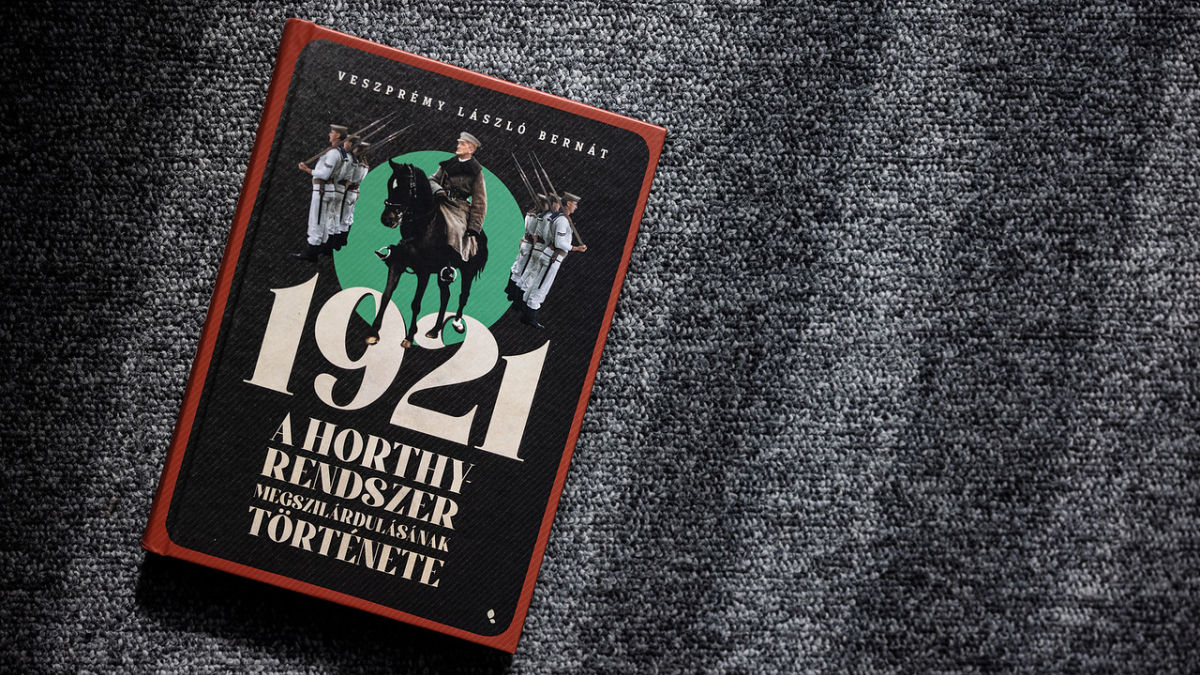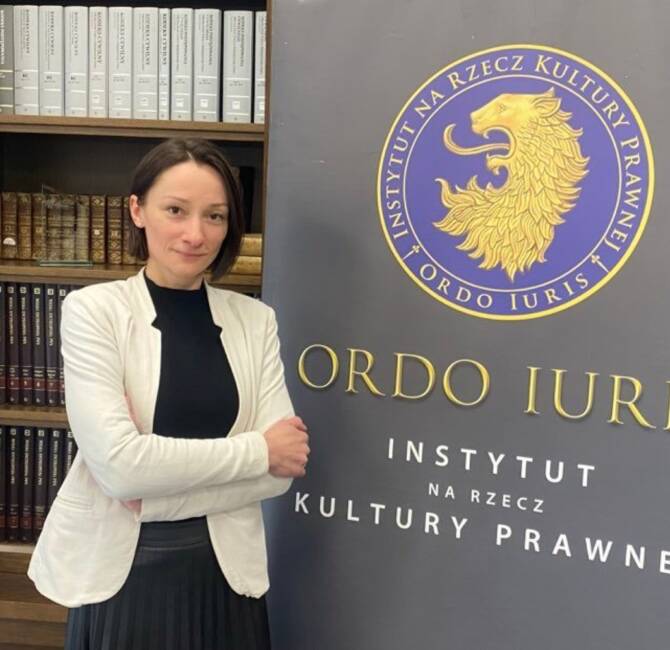Hungary – The following is an interview with the Hungarian historian, journalist, and publicist László Bernát Veszprémy, who said, “I don’t think there will be very much Muslim immigration into Central Europe.”
László Bernát Veszprémy graduated from the Reformed Károli Gáspár University and holds a Master’s degree in Holocaust Studies from the University of Amsterdam. He is currently a doctoral student at ELTE University’s School of Cultural History in Budapest. He was a contributor to the Jewish journal Szombat from 2016 to 2018 and was a researcher at the Veritas Historical Institute from 2017 to 2018. He has also been a research assistant at the Institute of Hungarian Jewish History of Milton Friedman University. Since the autumn of 2021, he has been the Editor-in-Chief of the Corvinák website, the Mathias Corvinus Collegium’s news analysis portal, after having been Deputy Editor-in-Chief of the Jewish news portal Neokohn. He is also a contributor to the conservative website and weekly Mandiner.
In 2021 he published two books. One was about the year 1921 in Hungary and the beginning of the Horthy era; the other was on the relationship between immigration and anti-Semitism in the West. Yann Caspar discussed these books with him on 8 June 2022 in Budapest, which made it possible to address issues such as the relationship of Hungarians to the Treaty of Trianon as well as the rest of their history, the challenges posed by non-European immigration, and the relations between Hungary and Israel.
Yann Caspar: We recently commemorated the centenary of the Treaty of Trianon: a peace treaty, or rather a diktat. How can we remember Trianon over a hundred years later?
László Bernát Veszprémy: I think the term “diktat” is very appropriate. If you look at the sources of the time, you can see that the Hungarian people were unanimously and massively opposed to this peace treaty, and experienced it as a temporary thing. This was true not only during the Horthy regime, but also during the period of the Károlyi revolution and the Republic of Councils, when it was already clear which territories Hungary would lose and where the enemy forces were located. Nobody was on the side of Trianon. Let’s just look at how the Communists had tried to win support: by launching a military campaign in the north and another one in Transylvania. I recently published an article in Mandiner based on the documents of the Magyar-Romanian Border Commission from the national archives. A British officer who visited the Partium at the time wrote very clearly that this region will never become Romania.
How can we remember Trianon today? On this point, it is important to note that history has moved in a different direction since then. We now think in terms of regions, regional cooperation; the European Union, NATO, and the United Nations exist. So – as Hungarian politicians often mention – Hungary has no territorial claims.
But this does not mean that Hungarians on the other side of the border should not have their rights defended.
Central and Eastern Europe today are faced with common problems; the V4 is a perfect example. Let’s take Magyar-Serbian relations: they are good and prosperous, which was also true of Magyar-Slovenian relations until recently. So when we talk about Trianon, nobody has the same approach as in 1920. Of course, the right to remember is ours, while defending the rights of the Hungarian nationality is our duty.
Yann Caspar: But how do you explain the fact that there has been no compromise on this issue within the current Hungarian political class?
László Bernát Veszprémy: I think we saw clearly during the last elections what the opposition is and what it represents. It managed to win in only about thirty municipalities, including Budapest. Of course, her voters have to be respected, but I am not sure that what the opposition politicians think is really relevant. They are obviously also trying to play at showing concern for Hungarian nationals abroad. Only they can say whether it is sincere or not. But I think that a national minimum of principles has emerged among the Hungarian political class. To say that 20 million Romanians are going to come and settle in our flats, as was said during the referendum campaign on dual nationality [in 2004], is no longer possible, in my opinion. It is no longer possible to talk about Hungarians from outside the borders in this way.
Yann Caspar: Last year you published a book called 1921. When we met for the first time, you mentioned the fact that this book had attracted a lot of criticism, from the left as well as the right. What happened when this book was published?
László Bernát Veszprémy: I would like to make one thing clear: on the whole, thank God, I received quite positive reviews, and the book became a bestseller in the history category on the Bookline website. My book’s reception has been generally positive. But yes, of course there were critics from the left and the right. On the right, Gábor Bencsik criticised me in the weekly Magyar Demokrata, while the same happened in the far-left magazine Múltunk [Our Past] from a man belonging to the liberal left, Ádám Gellért, who is a jurist and not a historian. I think it is a very good thing that there are debates in Hungary today: quarrels about our past, and lively debates from the left and the right. Everybody has their own forum, different opinions are expressed, and we are open to these opinions. As a conservative historian, my book could be published by a major mainstream publisher. This shows a healthy state of affairs.

I think that the Horthy era – let’s not even talk about the Second World War or the Holocaust period, but only the Horthy era – is still divisive. Hungarians can still have heated and passionate debates about what they think of Horthy, the Red Terror, and the White Terror. Some say it’s in the past and is forgotten, and those for whom it’s important are no longer alive. This is not true at all.
When I go to the provinces to do research and give lectures, I see that it is still important for the inhabitants of Sopron or Pécs, for example. For them, it is very concrete: they show photos of themselves with their fathers and grandfathers, and other relatives who were there, who are waving. These things still have an influence on their lives. There is still a lot of interest in this period.
Yann Caspar: In your book, you address points that can hardly be criticised and are likely to annoy all the political tendencies. For example, you say that there were public figures who supported Károlyi or the Communist regime – perhaps not actively – and who then became loyal supporters of the Horthy regime.
László Bernát Veszprémy: And not just anyone; Horthy himself offered his services to the War Ministry under Károlyi, who did not want them.
Yann Caspar: Yes, how do you explain this phenomenon? If I remember correctly, in your book you say that it is because of Hungary’s small size and because its political elite cannot be replaced in its entirety.
László Bernát Veszprémy: Both, yes. There is certainly some of that. This became very clear to me when I was researching the Republic of Councils and the Red Guard. I came across internal reports in which the Communists complained that there was no real Red Guard in the countryside, that the Royal Gendarmerie had simply been renamed the Red Guard and that there were no Communists in it. Then I saw the same thing during the German occupation: people who were anti-Nazi kept their positions in the administration. It was impossible to fire them all. But we can also talk about the period after the Second World War. When I was researching the People’s Courts, I was confronted with the fact that sometimes some of the People’s judges had not only been judges under Horthy, but also under Szálasi. So, first of all, you have to realize that you can’t fire everybody.
Secondly, there is the criticism that these were renegades, men who had turned their coats. There were certainly some, but I don’t think this was true of the majority of them.
It should be remembered that the Hungarian Right-wing tradition was already highly anti-liberal and anti-capitalist at that time, and the anti-Habsburg voices were very strong. In fact, for Right-wing Hungarians at the time it might even have seemed at first that this Aster Revolution of 1918 was not such a bad thing.
Even though the Social Democrats and bourgeois radicals were heavily involved, they thought that in return they could get rid of the Habsburgs and end market capitalism. The latter was referred to by many as the death of the Hungarian people. In a way, the revolution also meant the end of Dualist liberalism, as the Social Democrats and Radicals were anti-liberal on many points — for example, with regard to entrepreneurial freedom, private property, or workers’ rights. On these issues, they certainly did not represent the liberal point of view.
Yann Caspar: You mentioned the White Terror. We don’t talk about it as much nowadays as we do about other historical events. By the way, I know a lot of people who lived under Communism in Hungary, and they often tell me that in school, the White Terror was frequently talked about. They were not very receptive to this subject and thought, “What is this White Terror compared to what the Communists did in Hungary in the 20th century?” In your book, you don’t portray the White Terror in terms of its most common image. It seems to me that you were trying to portray the atmosphere of a whole era. Of course there were atrocities against Jews during the White Terror, but also against other groups. Am I wrong? What exactly did the White Terror entail?
László Bernát Veszprémy: I’m going to disappoint you a little bit, because I’m going to start from a different point. First of all, there is something very difficult to understand: before the First World War, violence was already strongly present — on a level that we can’t imagine today.
It was quite common to talk about violence and war, and to interpret society in terms of war or biological concepts. This was done on the right and the left. Then, between the war and the collapse, and afterwards during the civil war situation and the Red Terror, the public discourse was particularly violent. You have to understand that the country was in a crisis following a very intense wave of violence.
Many veterans had returned from the front and were trained killers. This is not a moral judgment, but a fact. There were a lot of men in the country who had a lot of military experience.
It is also important to note that during the Aster Revolution, the authorities carried out a very brutal repression, with many victims, of the peasant rebellions. This repression was followed by the Red Terror, which also claimed many victims, and then by the Romanian occupation, which also resulted in an extremely high number of deaths, more than a thousand: mass murders, massacres, pogroms, rapes, looting – a subject that has been totally forgotten. Then came the White Terror. I don’t want to whitewash the White Terror, but you have to understand that it was part of a larger wave of violence. Then you have to understand – and you summarised it very well – the atmosphere of the time, which of course included anti-Semitism. There was obviously an anti-Semitic component to the White Terror, and also a kind of phobia of the working class. At that time, the working class was still an existing and tangible social group in Hungary, and there were also antipathies towards it. There was also anti-Serbism, anti-Slavism in the southern regions, and anti-Germanism in western Hungary.
The White Terror should not be seen as a hermetically sealed entity, as something to be treated in isolation.
The Serbs committed atrocities at that time, very brutal atrocities, committing much more brutal acts in the Baranya region than the Hungarian troops. There was rape, murder, looting, and unimaginable destruction.
Yann Caspar: Let’s remember that Pécs was then under occupation…
László Bernát Veszprémy: Pécs had been under Serbian occupation since the end of the war, yes. And let’s not forget the Austrian Gendarmerie. I haven’t discovered any murders connected to them yet, but the Austrians kidnapped personalities who had Hungarian patriotic feelings, members of Parliament, and tortured them on Austrian territory. So the Austrian side also committed atrocities. It should be noted that in 1921, Hungary was not yet fully formed, either in terms of its borders or its political system. A real civil war situation had developed because of the efforts to restore the King Charles IV. There were atrocities in western Hungary, but there was also the reclamation of the Baranya-Baja region, and before that the Serbian occupation. So at that time there was still uncertainty, chaos, transitional situations, and violence in some parts of the country.
Yann Caspar: Somewhere in your book you wrote that apart from anti-Semitism, only anti-French sentiment was stronger at that time. I’m not talking about physical violence, of course, because there were hardly any French people in Hungary then. What do you have to say about this?
László Bernát Veszprémy: This is obviously related to Trianon. The two countries were at odds with each other in the First World War. Then there was a lot of anti-French literature, publications, and press articles.
It was fashionable to criticise not only the French, but also the West in general, as well as the Americanisation that was already underway.
The British liked the Hungarians, but there was also criticism of them. The most popular criticism was of the French. There is a little anecdote from a newspaper article. It’s about the former counter-revolutionary Prime Minister, István Friedrich, who said to his audience during a meeting: “And I didn’t even mention our greatest enemy,” and the crowd started to chant “Jews, Jews, out with them!”, and Friedrich then said, “No, no, I meant the French.”
Yann Caspar: But Horthy himself was anti-German, and rather Francophile and pro-British…
László Bernát Veszprémy: Horthy’s personality is a very interesting question. For a very long time in Hungarian historical literature, he was described as nothing more than a stupid and easily influenced sailor. It was ignored that he was multilingual, educated, something of an artist, and that he travelled a lot. He was not a man who was unfamiliar with high culture and high politics. It is very important to see that in his personality. And it is also very important to see that he was a talented politician, if you consider that political talent is about seizing and keeping power for a very long time. A lot of people say that he didn’t know politics. I don’t think that’s true at all. Look at the way he played the pro-Habsburg “legitimists” and the anti-Habsburg “elective monarchists” against each other, how he made the pro-Habsburg camp believe that he was pro-Habsburg and that he was going to let Charles IV. come back, and then how he asked the Entente for help by issuing statements against the various Habsburg restorations.
So Horthy was not at all a talentless politician; in fact, quite the opposite. This is not a moral judgment on my part, but simply an objective statement in light of the sources: he was very good at politics.
Yann Caspar: Let’s now jump forward a few decades. Since 2010, the perception of the Horthy regime by the political class has clearly changed; let’s not talk about 1944, as that would take us too far. The public discourse on the Horthy regime has become more positive in recent years – more positive than before 2010, for sure. At the same time, the Hungarian government is perhaps the most philo-Semitic government in Europe, and the most pro-Israel. How do you explain this?
László Bernát Veszprémy: I think you have to take into consideration that the attitude of Western Europe towards Israel is not fair, balanced, and rational. If you look at how many times Israel has been condemned in the UN, how many times Western and Northern Europe – not to mention Third World – countries have agreed with these condemnations, and how many times Iran, North Korea, or Venezuela, for example, have been condemned, then you will see a great disproportion. Countries vote against Israel all the time. This creates a kind of witch-hunt atmosphere. On the other hand, actual dictatorships are not criticised.
The Hungarian government’s attitude toward foreign policy is pragmatic and fair. Of course, every country has the right to make its own decisions in a sovereign manner, and Israel should therefore be treated in the same way as other countries. Hungary simply does not make a biased judgement of Israel, as many foreign policy makers in Western and Northern European countries are making. And, of course, we must also take into account, as Hungarian politicians and leaders have repeatedly done, that Israel is the key to stability in the Middle East. If Israel were to fall, it would have very serious consequences for Europe.
Yann Caspar: In your book Immigration and Anti-Semitism in the West, which was also published last year, you document very well the fact that anti-Semitism in the West today is mainly the result of Muslim immigration. It is clear that the kind of anti-Semitism that was experienced in the 19th and 20th centuries no longer really exists. You have analysed a new type of anti-Semitism. Immigration from outside Europe will pose enormous challenges for our continent in the years and decades to come. But do you think it is possible to confuse the subject of Islam with that of immigration? Many of these migrants will come from regions that are not Muslim…
László Bernát Veszprémy: It is worth reflecting on the fact that these anti-Semitic stereotypes do not exist only among Muslim Arabs, but also among Christian Arabs. So this issue cannot be reduced only to Islam. There have been cases where, for example, Arabs of Christian origin have arrived in Europe who believe in the same anti-Semitic stereotypes as Muslim Arabs. This is a possibility. But on the whole,
if you take the Middle East and North African (MENA) region, where the dominant religion is of course Islam, and look at its demographic indicators, by 2050 the population of this region will have grown by the equivalent of the current population of all Europe.
We will see a lot of Muslim immigration here. Even if we are very optimistic and say that only 10% of these people will emigrate – 40 million people – this will have unpredictable consequences for Europe, socially, culturally, and politically.
Yann Caspar: You recently published an article in the American Conservative magazine in which you hypothesise that in a few years, Viktor Orbán will be remembered as a liberal politician. Why is that? Much more radical personalities could come to power in Europe. Moreover, you conclude your article by saying that the scenario envisaged by Michel Houellebecq in Submission – namely, that of a Muslim becoming France’s leader – could come true. Fiction or reality?
László Bernát Veszprémy: I think it is possible, and that there will obviously be high-level political leaders of immigrant origin. It can start in a classical way; it is obvious that every community aspires to a certain level of political representation. One option is for Muslims to form their own parties. We already have a prime example of this: the DENK in the Netherlands, which is currently in Parliament. It is not a decisive party, but it exists, and in a sense it is the most successful example of an immigrant party which has been able to maintain its position through several elections. If you look at this party’s programme, it is very left-wing: it has woke positions, it is waging a cultural war and is of course anti-Semitic. It takes a stand against white privilege in the Netherlands and protests white street names. This is an example of a political trend.
In my opinion, there is an even more successful strategy: the hijacking of traditional left-wing or green parties. A good example of this is what is happening with the British Labour Party, whose leader was for a very long time a person of British origin: Jeremy Corbyn. Around him you had politicians from Muslim or Third World backgrounds who were very extreme in their anti-Semitism. Another good example is Ilhan Omar in the United States, who is a very successful politician who has been re-elected.

The role of women is very important in this kind of political strategy. Beyond a certain threshold, this contradiction will have to be addressed by the left-wing parties: Muslim candidates and immigrant candidates of Arab origin very often do not stand for progressive values, whether it is gay rights, philo-Semitism, freedom of speech, democracy, or transgender rights. They very often represent a harsh reaction to these issues. How do we overcome this problem? This is where figures like Ilhan Omar come in, who on the one hand is a woman and on the other espouses progressive rhetoric and comes from an immigrant background, while proudly embracing her Islamic faith. These are the kinds of figures who will become very important to the Western left in the future: Muslim women. There have been studies about this in some elections: left-wing parties deliberately put forward Muslim women because they can sell their femininity [to Westerners] as a feminist agenda, while voters of an immigrant background are sensitive to the fact that these candidates are Muslim.
Yann Caspar: Do you think this trend can reach Central Europe? Does Central Europe represent a different model from Western Europe, or is it just ten or fifteen years behind?
László Bernát Veszprémy: I don’t think there will be very much Muslim immigration into Central Europe.
In my opinion, the Central and Eastern European nations will, sooner or later, all follow the Hungarian model to a certain extent.
We understand what is happening in Western Europe, and we do not want to go down that road. The case of Slovakia shows this very well: for a very long time, it was the left that was against immigration, and then it was replaced by the right, which did not let any more immigrants in. So, no matter who was in charge in Slovakia, everybody rejected this extremism. I don’t think that the idea of replacing our society is at all popular in Central and Eastern Europe.




